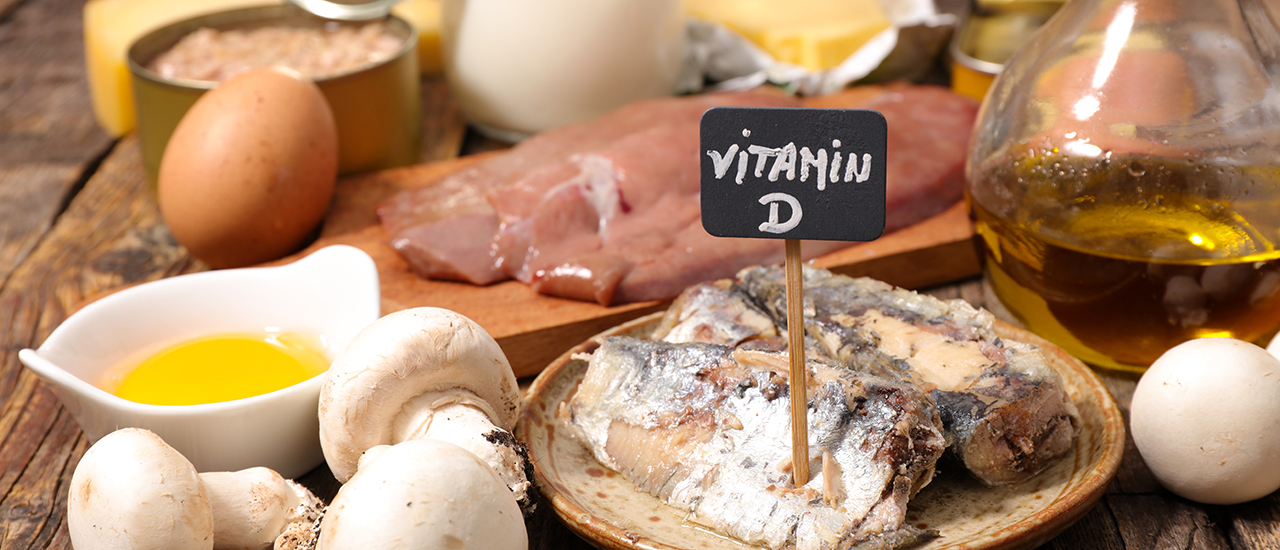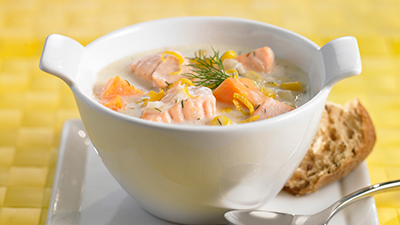
Milk, margarine, fatty fish and eggs are vitamin D superheroes.
Now that summer is over, are you getting enough vitamin D?
Victoria Beechum
There are so many fabulous reasons to get outside and enjoy those all-too-brief Manitoba summers. Getting your recommended daily dose of vitamin D is as good a reason as any. Nicknamed “the sunshine vitamin”, vitamin D is the only nutrient that the human body makes in response to exposure to ultraviolet rays from the sun.
But as we head into fall and winter, we northerners are at risk for not getting our recommended daily dose of this essential vitamin from sunlight alone.
“Season, time of day, cloud cover, smog, skin pigmentation, and sunscreen are all factors that can affect the amount of ultraviolet radiation we receive, and, consequently, the amount of vitamin D our bodies can synthesize,” explains Erin Blake, a clinical dietitian at Deer Lodge Centre.
To make matters more challenging for people over 50, Blake says, “As we age, we are less able to synthesize vitamin D from sunlight.”
Health Canada recommends that, in addition to following Eating Well with Canada’s Food Guide, everyone over the age of 50 should take a daily vitamin D supplement of 400 IU. For more information, visit www.canada.ca/en/health-canada/services/canada-food-guides.html/
Too little vs. too much
Vitamin D is a nutrient that helps the body use important minerals and elements like calcium and phosphorous to build and maintain strong bones and teeth. Too little vitamin D can cause calcium and phosphorus levels in the blood to decrease, leading to calcium being pulled out of the bones to help maintain stable blood levels. This can cause rickets in children and osteomalacia (softening of the bones) or osteoporosis (fragile bones) in adults.
As with any medication or supplement, it’s important to follow recommended daily doses: “Too much vitamin D can cause too much calcium to be deposited in the body,” warns Erin Blake, “which can lead to excessive buildup of calcium in the kidney and other soft tissues including the heart, lungs and blood vessels.”
Common dietary sources of vitamin D
You’re most likely to find vitamin D in fortified foods. In Canada, cow’s milk and margarine must be fortified with vitamin D. Goat’s milk, fortified plant-based beverages (fortified soy beverages, for example), and some calcium-fortified orange juices can be fortified with vitamin D. Cheese and yogurt can be made with vitamin D-fortified milk – however, the final product does not contain as much vitamin D as fluid milk alone. The only natural sources of vitamin D in the Canadian food supply are fatty fish such as tuna and salmon, and egg yolks.
“Because it’s a commonly-consumed food, fluid milk is a major dietary source of vitamin D,” says Blake, “Follow Canada’s Food Guide recommendations for dairy intake and ensure you are selecting vitamin D fortified foods when available.”
Recommended dosages for vitamin D supplements
Breastfed infants should get a supplement of 400 IU of vitamin D every day until they are two years old. Infants who are fed only formula do not need a vitamin D supplement. The formula already provides enough.
Adults younger than 50 will be able to get some of their vitamin D intake from the sun in the warmer months. Unfortunately, thanks in part to our latitude here in Manitoba, our exposure to the sun drops dramatically in the winter, which means we often can’t store enough vitamin D in our bodies to last through to spring. Manitobans should consider taking vitamin D supplements in the winter months.
“If a person follows a healthy diet and takes a daily vitamin D supplement, they should be able to maintain normal vitamin D levels,” says Blake, “whereas a diet that has little to no vitamin D and no supplements can put a person at risk for deficiency.”
 Recipe:
Recipe:
Corn, sweet potato and salmon chowder
Comforting chowder is even better with the bright colour and flavour of sweet potatoes and salmon. Serve with a slice of whole grain bread and a green salad for a complete meal. This recipe packs a wallop of vitamin D with approximately 300 IU per serving!
Serves 4. Prep: 10 min. Cook: 25 min.
Ingredients
- 2 tsp (10 mL) vegetable oil
- 1 onion, finely chopped
- 1 clove garlic, minced
- 1 tsp (5 mL) dried dill weed
- Pepper
- 1 sweet potato, peeled if desired and cut into ½-inch (1 cm) cubes (about 2 cups/500 mL)
- 1½ cup (375 mL) corn kernels (fresh, or frozen and thawed)
- 2 cups (500 mL) water
- ¼ cup (50 mL) all-purpose flour
- 2 cups (500 mL) 1% milk
- 12 oz (375 g) skinless salmon fillet, cut into chunks 1 tsp (5 mL) grated lemon zest
- 3 tbsp (45 mL) freshly squeezed lemon juice
Directions
- In a large pot, heat oil over medium heat. Sauté onion, garlic, dill and ¼ tsp (1 mL) pepper for about 5 minutes or until onions are softened. Stir in potatoes, corn and water; bring to a boil over high heat. Cover, reduce heat to medium-low, and simmer for 5 to 10 minutes, or until potatoes are almost tender
- Increase heat to medium. Whisk flour into milk and gradually stir into pot. Stir in salmon. Simmer, uncovered and stirring often but gently, for about 5 minutes or until salmon is firm and opaque as soup is thickened (do not let boil). Stir in lemon zest and juice and season to taste with pepper. Ladle into warmed bowls.
Nutritional info per serving (1 of 4)
- Calories: 383
- Protein: 27 g
- Total Fat: 17 g
- Saturated Fat: 4 g
- Cholesterol: 58 mg
- Carbohydrates: 33 g
- Fibre: 3 g
- Sugars: 10 g
- Added sugars 0 g
- Sodium: 131 mg
- Potassium: 814 mg
- Vitamin D: 300 IU
Source: www.heartandstroke.ca/get-healthy/recipes/fish-and-seafood/corn-sweet-potato-and-salmon-chowder. Recipe credit: Emily Richards (PH Ec)
Recent News

Embracing Hope: The Impact of DLC’s Movement Disorder Clinic

Winnipeg Jets Parkinson’s Disease Awareness Game!

